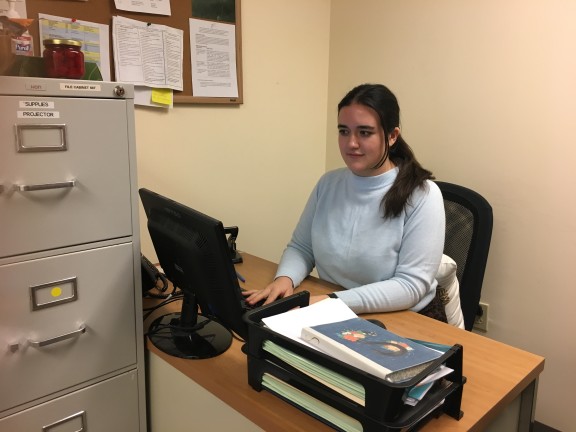A Glimpse into NSC's Anti-Human Trafficking Program

I am happy to be on a very supportive and collaborative team that regularly brainstorms and discusses best solution for clients.
As part of Human Trafficking Awareness month in January, communications staff at NSC had a Q and A with Anti-Human Trafficking Case Manager Stephanie Blakeman.
Where are you from, and what first brought you to Philadelphia if you're not from here? Did you go away to college?
I am originally from Washington, D.C., but moved to Philadelphia after college to work at a legal aid organization. I worked in legal services until I started full time at NSC.
How long have you been working at NSC? Have you had any other roles here? What are your favorite things about NSC as a whole?
I started at NSC as a part-time case manager in 2014 before starting full time two years ago. I love that NSC staff and clients come from every corner of the globe. I learn so much from my coworkers' kindness, patience and expert competency every day!
Please share a little bit about your story with Anti-Human Trafficking Work. How did you first get involved? What has kept you engaged since then?
I began working with NSC because I wanted to work with the immigrant and refugee community in Philadelphia. Since I speak Spanish, and most of our clients are Latino, I knew that I could provide the most assistance to my community in this role. When I started I did not know anything about human trafficking or labor trafficking in the U.S. but this job has put me in a position to learn the nuances and scope of trafficking in the U.S., and the people negatively impacted by this crime. Because we provide client-centered services, every day is different and each client brings with them a unique set of circumstances but also strengths. Seeing clients progress is the best part of the job.
What might a typical day look like working on the Anti-Human Trafficking Initiative look like?
A typical day starts with returning phone calls to clients who may be calling about utility bills, medical appointments, or their children's food stamps. After that, I may accompany a client to apply for their Social Security Number or meet a client as they sort through NSC's household item and clothing donations to take home what they need. I spend part of the day reaching out to other community organizations to locate resources for my clients. Finally, my day is not complete without the requisite paperwork: updating case notes and service plans and maintaining client files.
What are some of the most challenging aspects of your work? The most rewarding?
The most challenging aspect of my job is confronting the uncertainty that my clients face: will they need to go to court? Will their visas be approved? How can we maintain their safety? In these moments, I am happy to be on a very supportive and collaborative team that regularly brainstorms and discusses best solutions for clients. The most rewarding moments are when a client, who has waited between 9 - 15 months for a decision about their immigration case, receives notice that they do not have to return to their country because of the victimization they suffered. I am glad that our clients have the opportunity to stay in the U.S. to provide for their family without fear, fraud or coercion from their traffickers.
What information do you think is most important for the public to know about human trafficking? How might a person become an ally to victims/survivors of human trafficking?
Human trafficking in the U.S. remains "in the shadows" and many people do not realize that labor trafficking occurs in many common industries: landscaping, agriculture, nail salons, restaurants and hotels. Being aware that sex and labor trafficking is a scourge upon the immigrant community in the U.S. is the first step. Getting involved with an agency that has an active anti-trafficking initiative, like NSC, is another good way to give back to the community.